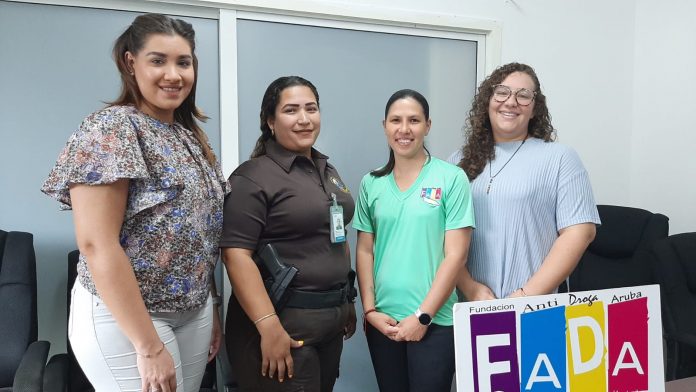On the 26th of June was conmemorated the International Day Against Abuse and Illicit Traffic of Drugs. Anti-Drug Foundation Aruba (FADA), together with other agencies joined together in a press conference on the 27th of June to pay attention to awareness and prevention.
United Nations Organization stands still to reinforce action and cooperation for a society that is free of drugs. Since it’s approval in 1987, this day is used to gather people, community and organizations all around the world to create awareness about the important problem that illicit substances represent to society.
Rulienne Arends, preventive worker for FADA, said that the 26th of June is a very important day for this and other agencies, on which they celebrate International Day Against Abuse and Illicit Traffic of Drugs. United Nations for 2022 chose the motto ‘Care in Crises’, a campaign focused on the humanitarian side.
For this reason, United Nations calls upon governments, international organizations, civil society and every interested person to take urgent action to protect people. The campaign highlights data from the report by United Nations Office on Drugs and Crime (UNODC), which presents facts and practical solutions for the drug problem and to support a sanitary vision for everyone, based on science.
Arends expressed that two years ago situation was very intense because of the Covid-19 pandemic, and FADA received a lot of calls from people, be it for themselves or members of their family, because of lost jobs, loss of fixed income, or deceased family members which caused them to fall back into addiction.
For many years, FADA has been working for prevention, giving talks to children 4 years and older, to explain about all the dangers that use of legal or illegal substances has on people’s health. Arends explained that they have given talks to adults up to 80 years old, so they can have all the information they need.
This effort isn’t only FADA’s job, but also other agencies which every day fight and prevent the use and illicit traffic of drugs. At the press conference was also present the Department of Customs, represented by Kathleen Faro, who is assistant manager, and also by Denice Kelly, who works as dog handler for Customs. Kelly said that their job is focused primarily on weapons, drugs and money, working together with six dogs they have in the department. She also indicated that they work together with the Police Force and Coast Guard. They also check passengers arriving at the airport and on cruise ships.
Drug trafficking continues day by day, with people trying a thousand different ways to either take out or bring in illicit substances. Kelly says that most cases they encounter are people trying to travel with the substances.
Also at the press conference was the social worker of Stichting Hunto (Together Foundation), Michelle Lont, who said that unlike the work that FADA does for prevention, Stichting Hunto works on treatment. They have two types, ambulatory and intramural.
For the ambulatory part, Lont said that through partner organizations which refer clients to them, Stichting Hunto works with the private and public sector, hospitality, school of the Aruban community directly. When a client is referred to Stichting Hunto, they carry out various drug tests, alcohol test and consumption to identify the degree of seriousness of the person’s addiction. They work with psychoeducation, psychopedagogy, social workers and a psychiatrist to determine the type of help that the person needs, and then proceed depending of the amount of sessions the client needs.
If the ambulatory treatment doesn’t work for the client, then they proceed to the intramural part, which according to Lont, is like a rehabilitation center. There they advice the client, but don’t demand, that they enter the rehabilitation center on a basis of three, six or nine months, during which they receive psychoeducation so they can go back into the community – this because some of them forget some basic necessities about how to integrate back.
The admission criteria, according to Lont, is that when a person enters the rehabilitation center, they must be 18 years or older, and they don’t accept people older than 65. This is because underage children require specific professional care that they don’t have available at the moment. “If we put an underage child right now together with a person 18 or older, the thought and the care are completely different”, according to Lont. Neither do they accept people with mental or physical health problems.
Lont also highlighted that World Organization Drugs and Alcohol mentions that on 2019, more than half a million people died as a result of addiction, and they expect that by 2030 this is going to rise with 11 percent. As a representative of Stichting Hunto, she expressed that they have noticed and experienced an increase in the amount of clients. In 2020 they helped 960 clients and in 2021 they helped more than 1,500 clients, of which 4 percent asked for intramural help and 96 percent asked for ambulatory care.
For this reason they wanted to give attention to this day, so that people can be aware of what drug and addiction can cause, not only to individuals, but to entire communities.




















